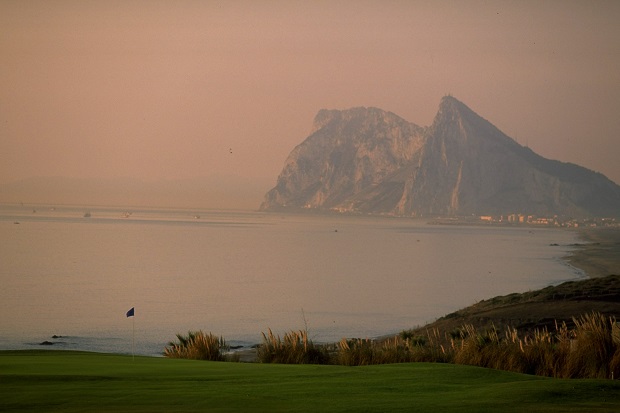The most dramatic part of Lothar-Günther Buchheim’s unmatched submarine novel, Das Boot, takes place beneath the Straits of Gibraltar, when Buchheim’s U-boat is ordered from the Atlantic to the Mediterranean. ‘How can we get through?’ Asks one of the luckless crew, certain that Gibraltar’s massive defences will be the death of them. At least 9 U-boats were destroyed making that perilous run during the Second World War.
The story of Gibraltar is not merely a tale of garrisons and gunships. The Spectator’s unique archive provides some insight into the life of the colony over the last 200 years, especially at times when the Rock became embroiled in Spanish intrigue or when it was threatened by Madrid’s aggression. Such episodes invariably coincide with periods of weakness or chaos in Spain.
In April 1831, our correspondent noted that ‘Some attempts have been made on the side of Gibraltar to excite a rising among the apathetic Spaniards against their lord; but in vain.’ Exiles from the court of Ferdinand III had fled to Gibraltar, where they were promised protection from a king whom the Spectator described as ‘the tyrant’ on the grounds that he had decreed a state of martial law. In December 1831, Ferdinand summarily executed a number of rebels who had quit Gibraltar on receiving false information that they would be welcome in Malaga. Among the dead was an Englishman named ‘Don Roberto Boyd’. The Spectator remarked of another newspaper’s coverage of the atrocity:
‘The Courier says, Ferdinand may shelter himself from censure in murdering Mr Boyd under his own law, which made it death in any man to land in Spain for the purpose of subverting his Government. The Courier forgets that, the dispute is whether Ferdinand could make a law to condemn an Englishman without trial. Suppose he made a law to hang all Englishmen who landed in Spain after the 1st of April next, should we allow him to put it in execution?’
Was Don Roberto Boyd a Gibraltarian? If so, the Spectator saw no reason to differentiate between Englishman and Gibraltarian.
The rights of the freeborn Englishman are one fact of life, organised crime another. An article of 1841 (during another period of war in Spain) noted that:
‘It is scarcely an exaggeration to say, that five-sixths of the foreign trade of Spain (at least in so far as importation is concerned) is carried on by smuggling. English goods are smuggled in from Gibraltar…’
As it happens, the concluding part of a TV drama about drug smuggling through Gibraltar will air tonight. Plus ça change…
Obviously we took in the world wars, the Spanish Civil War and the intermittent crises through the Franco and democratic eras in Spain. These moments of crisis, such as that of the present, draw attention to the strange ways of the ‘Gibraltese’ and their odd place in history. Anthony Burgess, who helped to train the Gibraltarian Defence Force during World War Two, wrote in April 1965 (when General Franco threatened the colony’s sovereignty):
‘They have never been taken seriously enough by the rest of the world, meaning that small part of the world that knows they exist. Popular novelists call them ‘Gibraltese’ and visiting sailors call them ‘Rock scorpions’. They have no sense of ethnic identity. Their stock is compounded of Genoese, Maltese, Moroccan, Portuguese and time-expired British elements, though some Spanish blood has inevitably trickled in from La Linea and Algeciras. They are bilingual, though Spanish has to be taken as their first language, since it colours their English. Their Spanish is that of Andalucia, somewhat blurred and weak on the s-phoneme. Unfortunately they have no real indigenous culture — no literature, no music or painting. It is easier to get these from Spain or the UK than to grow them on rock. They are forced to lean. Geography makes them lean one way and history another. Geography is an accident, however; history starts as an accident and ends as a matter of conscious choice and deliberate aspiration. The Gibraltarians are determined to be British.’
And so it remains. Grasp that and you have the root of the problem.
Search the archive to find out more about Britain and the Rock.






Comments